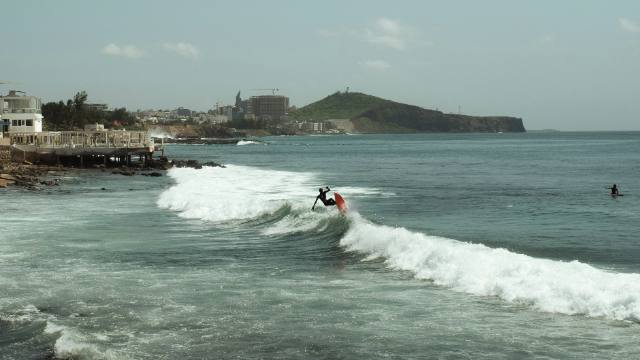Senegal – Ibrahima Bathily says he no longer recognises the beachfront in the area of Senegal’s capital Dakar where he grew up.
“The entire coast is privatised. It has become impossible to access the sea without paying,” he complained.
Buildings have sprung up on all sides of his makeshift bar that stands on rocks facing the Atlantic Ocean.
Even the 100-metre (yard) beachfront strip that is state-owned and prohibited from being built on, has not escaped.
Just a few years ago, bathers thronged the area, enjoying a cool dip in the waves overlooked by the city’s emblematic Mamelles twin hills.
But Dakar has undergone voracious building work.
Home to around a quarter of Senegal’s population and its economic hub, the number of Dakar residents swells by three percent every year.
As the capital of a West African nation renowned as stable in a troubled region, the city also draws many foreigners.
Construction sites are everywhere, real-estate prices are soaring – and the coastline is disappearing under a sea of concrete.
“It’s incredibly fast. You wake up one day and you find a building somewhere,” Bathily said.
He says he has been approached several times to give up his bar in return for money.
Such an offer can be tough to turn down when the median wage was 54,000 CFA francs ($88,82 euros) a month in 2017.
All around the peninsula on which Dakar is built, beaches have been nibbled back to a bare minimum.
Locals are despondent about the loss of access due to the arrival of luxury hotels, villas or clinics, as well as over how it has all been allowed to happen.
But despite public exasperation, “we are unable to truly unite energy and forces,” Oumar Diagne, of the SOS Littoral (SOS Coastline) NGO said.
Money laundering
Building screeched to a halt, however, at the end of April after Senegal’s newly elected leaders took over, pledging integrity and transparency.
They ordered a two-month suspension of all construction on the strip that remains in the state’s hands to verify the legality of occupancy rights.
La Direction de la Surveillance et du Contrôle de l’Occupation du Sol (Dscos) a décidé de faire stopper tous les travaux de construction qui sont en cours sur les corniches de Dakar et au niveau de la bande des filaos aussi. pic.twitter.com/huv0cvzXNh
— Projet PASTEF🇸🇳🇸🇳🇸🇳 (@projetpastef) April 29, 2024
The outcome is eagerly awaited, Bathily said.
But records in the land registry are notoriously difficult to decipher despite them now being online.
The vast financial sums at stake also feed suspicions of widescale money laundering.
“Real estate is a sector that is particularly targeted by money launderers” whether for drug trafficking, illegal migration or corruption, a finance ministry unit tasked with fighting money laundering and financing of terrorism, told AFP.
“Senegal is no exception,” it added, mentioning only “inspections” when describing what action it takes.
Many buildings do have the proper deeds.
Mamadou Diangar, a public law researcher, said authorities can permit building to go ahead by delisting a spot on the strip.
Lawmakers did not set “precise criteria” for the delisting of a building, he said, leaving the law open to interpretation.
New choices
New Prime Minister Ousmane Sonko promised while still in opposition that he would ensure all illegally constructed buildings were pulled down.
But, warned Diangar, that could prove “legally very complicated and costly, because these are not small investments”.
“Is the budget of the Senegalese state able to bear this compensation?” he asked. “It will need strong political choices.”
Sonko chose a Dakar beach with a building site backdrop when he pledged to crack down on offenders in 2020.
Those projects are now complete, with several-storey-high luxury buildings blotting out a stretch of the old beach.
Not far away, the cabin of former fisherman Bathie Faye has managed to survive.
Considered a temporary structure, it is authorised to be on the strip where Faye earns a living providing services to those using what is left of the beach.
But he fears the demand for beachfront real estate means it is only a matter of time before he is moved on.
It would not be the first time.
Under the presidency of Abdoulaye Wade, who also vowed to combat rampant building, police turned up one day and dismantled Faye’s previous cabin ahead of the start of construction work.
“You can’t fight people who are stronger than you,” he said.
Follow African Insider on Facebook, Twitter and Instagram
Source: AFP
Picture: Unsplash
For more African news, visit Africaninsider.com


